新概念英语第一册Lesson55~64课文注释
新概念英语第一册lesson55-56(推荐完整)

housework n.家务
Do you often do housework at home? clean the floor / wash the dishes cook dinner
lunch 午饭 breakfast supper dinner(较正式,一般指晚宴) meal [mi:l] 餐 have a big meal
Analyze of the passage
take Please take me with you. take care / take good care of take away see friends visit friends from 从…
from 从……
He is from Sweden. back from work I just back form GZ. then 然后 I always eat, then go the bed. and then First, open your book, and then… 先听录音,然后回答问题。
afternoon 下午
noon 中午,正午 = midday at noon = at midday 在正午 in the morning in the afternoon in the evening at night/noon I often watch TV at night.
usually adv.通常
Key Structures
1.Mr. Sawyer stays at home every day. 2.She always eats her lunch at noon. 3.She usually sees her friends. 4.They often drink tea together. 5.The children always do their homework 6. Mr. Sawyer usually reads his
新概念英语第1册课文+译文
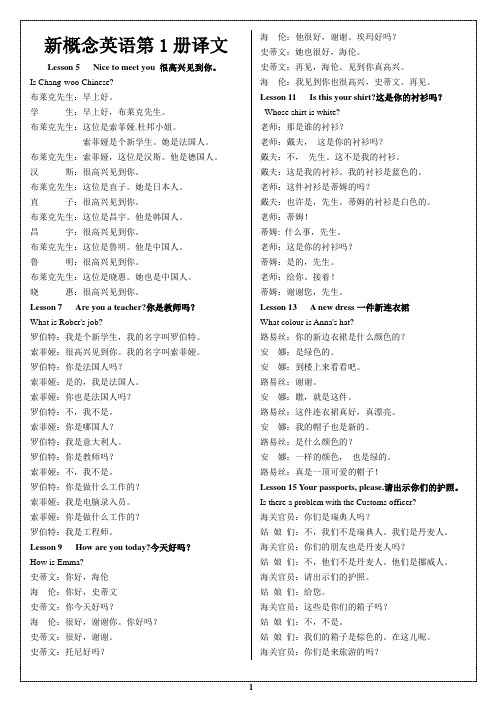
新概念英语第1册译文Lesson 5 Nice to meet you 很高兴见到你。
Is Chang-woo Chinese?布莱克先生:早上好。
学生:早上好,布莱克先生。
布莱克先生:这位是索菲娅.杜邦小姐。
索菲娅是个新学生。
她是法国人。
布莱克先生:索菲娅,这位是汉斯。
他是德国人。
汉斯:很高兴见到你。
布莱克先生:这位是直子。
她是日本人。
直子:很高兴见到你。
布莱克先生:这位是昌宇。
他是韩国人。
昌宇:很高兴见到你。
布莱克先生:这位是鲁明。
他是中国人。
鲁明:很高兴见到你。
布莱克先生:这位是晓惠。
她也是中国人。
晓惠:很高兴见到你。
Lesson 7 Are you a teacher?你是教师吗?What is Rober's job?罗伯特:我是个新学生,我的名字叫罗伯特。
索菲娅:很高兴见到你。
我的名字叫索菲娅。
罗伯特:你是法国人吗?索菲娅:是的,我是法国人。
索菲娅:你也是法国人吗?罗伯特:不,我不是。
索菲娅:你是哪国人?罗伯特:我是意大利人。
罗伯特:你是教师吗?索菲娅:不,我不是。
罗伯特:你是做什么工作的?索菲娅:我是电脑录入员。
索菲娅:你是做什么工作的?罗伯特:我是工程师。
Lesson 9 How are you today?今天好吗?How is Emma?史蒂文:你好,海伦海伦:你好,史蒂文史蒂文:你今天好吗?海伦:很好,谢谢你。
你好吗?史蒂文:很好,谢谢。
史蒂文:托尼好吗?海伦:他很好,谢谢。
埃玛好吗?史蒂文:她也很好,海伦。
史蒂文:再见,海伦。
见到你真高兴。
海伦:我见到你也很高兴,史蒂文。
再见。
Lesson 11 Is this your shirt?这是你的衬衫吗?Whose shirt is white?老师:那是谁的衬衫?老师:戴夫,这是你的衬衫吗?戴夫:不,先生。
这不是我的衬衫。
戴夫:这是我的衬衫。
我的衬衫是蓝色的。
老师:这件衬衫是蒂姆的吗?戴夫:也许是,先生。
蒂姆的衬衫是白色的。
新概念英语第一册第55课

• nnigighhtt 一n般. 指夜夜间里 • 晚安 • good night • 在夜里 • at night • 一整夜 • all night • =the whole night • He always does his
stay with sb和某人呆在一起。 她总是和我呆在一起。
eg: She always stays with me.
欧姆龙贸易(上海)有限公司
home
n. 家 ;adv. 住家,到家 1) n. 家 欢迎来我家
eg: Welcome to my home . 在家
at home 呆在家
stay at home 她总是呆在家
• •
我W们e 通u常su在aulls家yuad做loly我ou们r 的hao家dmv庭e.w作通or业常k 。at
home .
• 她通常在晚上打扫房间。
• eg: She usually cleans her room in the evening .
• together adv. 一起
• 一起做某事
She always eats her lunch at noon 。(在正午)
欧姆龙贸易(上海)有限公司
In the afternoon, (在下午 )
she usually sees her friends 。
他总是会见他的朋友 They often drink tea
together.
他们经常在一起喝茶
新概念英语第一册Lesson55~60自学笔记精讲解析
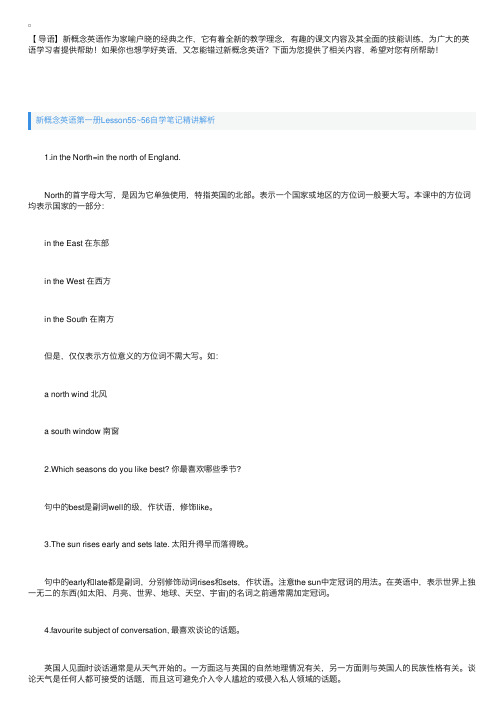
【导语】新概念英语作为家喻户晓的经典之作,它有着全新的教学理念,有趣的课⽂内容及其全⾯的技能训练,为⼴⼤的英语学习者提供帮助!如果你也想学好英语,⼜怎能错过新概念英语?下⾯为您提供了相关内容,希望对您有所帮助!新概念英语第⼀册Lesson55~56⾃学笔记精讲解析 1.in the North=in the north of England. North的⾸字母⼤写,是因为它单独使⽤,特指英国的北部。
表⽰⼀个国家或地区的⽅位词⼀般要⼤写。
本课中的⽅位词均表⽰国家的⼀部分: in the East 在东部 in the West 在西⽅ in the South 在南⽅ 但是,仅仅表⽰⽅位意义的⽅位词不需⼤写。
如: a north wind 北风 a south window 南窗 2.Which seasons do you like best? 你最喜欢哪些季节? 句中的best是副词well的级,作状语,修饰like。
3.The sun rises early and sets late. 太阳升得早⽽落得晚。
句中的early和late都是副词,分别修饰动词rises和sets,作状语。
注意the sun中定冠词的⽤法。
在英语中,表⽰世界上独⼀⽆⼆的东西(如太阳、⽉亮、世界、地球、天空、宇宙)的名词之前通常需加定冠词。
4.favourite subject of conversation, 最喜欢谈论的话题。
英国⼈见⾯时谈话通常是从天⽓开始的。
⼀⽅⾯这与英国的⾃然地理情况有关,另⼀⽅⾯则与英国⼈的民族性格有关。
谈论天⽓是任何⼈都可接受的话题,⽽且这可避免介⼊令⼈尴尬的或侵⼊私⼈领域的话题。
语法 Grammar in use like (v.)与like (prep.) like(v.)表⽰“喜欢”、“想要”(请参见 Lessons 47~48词汇部分),⽽like(prep.) 表⽰“像……⼀样”: His car is like mine. 他的汽车跟我的那辆⼀样。
新概念英语第一册第55课 (2)

2.The +姓氏复数
The Sawyers live at 87 King Street.
做主语视 为复数, 谓语动词 用复数
KEY WORDS live 住、 生活
live in 住在……(国家或城市)
待在家里
Mrs Sawyer stays at home every day.
She does the housework.
做家务
She always eats her lunch
at noon.
In the afternoon, She usually sees her friends. They often drink tea together.
• 注意:不能说和上一个同学一样的单词或 将土豆掉在地上。
87 King Street
The Sawyers live at 87 King Street.
In the morning,
Mr. Sawyer goes to work and the children go to school.
Their father takes them to school every day.
live at 住在……(有确切地址的小地方)
KEY WORDS
at 5 Zhushan Road. I live ____
He lives ____ in England.
lunch
午饭
n.
breakfast n. 早餐 supper n. 晚饭 have breakfast 吃早餐 have lunch 吃午饭 have supper 吃晚饭
新概念英语第一册Lesson55~60语法及单词解析

新概念英语第一册Lesson55~60语法及单词解析新概念英语第一册Lesson55~56语法及单词解析语法 Grammar in use一般现在时(请参见第47-48课_A cup of coffee语法部分。
)一般现在时用于表示一个习惯动作、有规律的行为以及永恒的现象。
一般与时间频度副词和时间短语连用。
这些时间短语有:every day/week/month/year 每日/周/月/年in the morning/afternoon/evening 在上午/下午/晚上at noon/night 在正午/夜里第3人称单数的谓语动词需加以变位,这可分为几种情况:(1)直接加 -s,如:come----comesarrive----arrives(2)以 -sh, -ch, -o 以及 -s结尾的动词加 -es,如:wash----washesgo----goeswatch----watchesdo----does(3)以辅音加 -y结尾的动词,把 -y改成 -i,再加 -es;而元音加 -y结尾的动词,只加 -s即可:hurry----hurriescarry----carriesplay----playsstay----stays词汇学习 Word study1.arrive v.(1)到达;到来:We arrived home early.我们很早就到家了。
The train is expected to arrive in London at 8. 20 p. m.火车预计在晚上8点20分抵达伦敦。
(2)(时间等)来临;(婴儿)出生:At last the day of graduation arrived.毕业的那一天终于来临。
Elizabeth's baby arrived at midnight.伊丽莎白的婴儿是在午夜时分降生的。
2.live v.(1)居住;生活:Frank lives in Paris.弗兰克居住在巴黎。
新概念英语第一册第55-56课内容讲解

新概念英语第一册第55-56课内容讲解新概念英语第一册第55-56课内容讲解导语:一家人无非是上班的上班,上学的上学,日复一日,但也活得安逸。
下面YJBYS店铺分享一篇关于索耶一家人的英语课文,欢迎学习!Lesson 55 The Sawyer family索耶一家人Listen to the tape then answer this question. When do the children do their homework?听录音,然后回答问题。
孩子们什么时候做功课?The Sawyers live at 87 King Street.索耶一家住在国王街87号。
In the morning, Mrs Sawyer goes to work and the children go to school.早上,索耶先生去上班,孩子们去上学。
Their father takes them to school every day.父亲每天送孩子们去上学。
Mrs Sawyer stays at home every day. She does the housework.索耶夫人每天呆在家里。
她料理家务。
She always eats her lunch at noon.她总是在正午吃午饭。
In the afternoon, she usually sees her friends. They often drink tea together.下午,她总是会见她的.朋友。
她们经常在一起喝茶。
In the evening, the children come home from school. They arrive home early.傍晚,孩子们放学回家。
他们到家很早。
Mr Sawyer comes home from work. He arrives home late.索耶先生下班回家。
他到家很晚。
新概念英语第一册Lesson 55 The Sawyer family
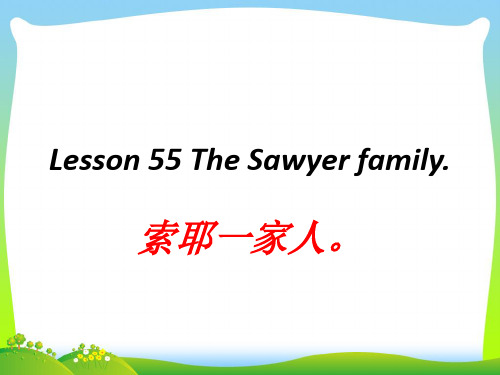
• Watch the video and answer the question.
• When do the children do their homework?
• 索耶一家住在国王街87号、
• 早上,索耶先生去上班,孩子们去上学。父亲每天送孩 子们去上学。
Jimmy doesn’t have lunch at home
3.My father usually reads newspapers in
the morning.(对划线部分提问)
What does your father usually do in the morning?
4.She often does her homework at night.(改一般疑问 句)
(read) • 8. We are going ______ the flowers to the teacher.
(send) • 9. I can’t go now. I must ______ my homework. (do) • 10. Look, they ______ (work) hard.
A. Do, watch B. Does, watches C. Does, watchs D. Does, watch
1.My sister often goes to school on foot. (对划线部分 提问) How does your sister go to school?
2.Jimmy has lunch at home.(改成否定句)
Greece. (come) • 4. The father ______ his children to school now. (take) • 5. Mrs. Smith ______ at home every day. (stay) • 6. The girl can ______ the vase on this table. (put) • 7. Mr. Sawyer usually ______ his newspaper at night.
新概念英语第一册1-65课单词带注解

新概念英语第一册1-65课单词带注解1excuse v. 原谅me pron.我(宾格)I(主格)my(物主代词) we(复数主格)us(复数宾格)mine(n性物主代词) yes adv. 是的is v. be动词现在时第三人称单数this pron. 这(对应词that)(复数these) your possessive adjective 你的,你们的handbag n.(女用)手提包pardon int. 原谅,请再说一遍I beg your pardon=Say it again.it pron. 它thank you 感谢你(们)=thanksvery much 非常地修饰V词放在句末,或V后面。
2pen n.钢笔所有笔的总称pencil n.铅笔book n.书,本,预定watch n.手表,V观看coat n.上衣,外衣,遮阳伞的涂层raincoat 雨衣dress n.连衣裙 V给...穿衣服skirt n.裙子,短裙shirt n.衬衣的总称,男衬衣(对应词:女衬衣blouse)car n.小汽车,汽车的总称house n.房子3umbrella n.伞(用an/a区别它与雨衣)please int.请,V使...高兴here adv.这里(对应:there)my possessive adjective 我的ticket n.票(+to 去某地的车票)number n.号码,数字five num.五sorry adj.对不起的+for+n :+to+v :sir n.先生cloakroom n.衣帽存放处4suit n.一套衣服,V合适school n.学校teacher n.老师,V:teachson n.儿子(同音词:sun)daughter n.女儿(与son互为对应词)5Mr. 先生(全称:mister)good adj.好(adv:well)morning n.早晨,上午Miss 小姐,错过,思念new adj.新的(对应词:old)student n.学生(V:study)(小学生:pupil) French adj.&n.法国人(n:France) German adj.&n.德国人(n:Germany) nice adj.美好的(各种好:好吃的、好玩的)meet v.遇见(同音词meat)Japanese adj.&n.日本人(n:Japan)(复数是本身)Korean adj.&n.韩国人(n:Korean)Chinese adj&n.中国人(n:China 中国,瓷器:复数是本身)too adv.也(同音词:to two)(否定句中用either)6make n.(产品)牌号,V制作,V使...怎样(首选接adj,否则用v 原形)Swedish adj.瑞典的English adj.英国的American adj.美国的Italian adj.意大利的Volvo n.沃尔沃(Swedish)Peugeot n.标致(French)Mercedes n.梅赛德斯(German)Toyota n.丰田(Japanese)Daewoo n.大宇(Korean)Mini n.迷你(English)Ford n.福特(American)Fiat n.菲亚特(Italian)7I pron. 我(同音词:eye)am v. be动词现在时的第一人称单数(不能与not合起来缩写) are v. be动词现在时复数(同音:“r”)name n. 名字what adj.& pron. 什么nationality n. 国籍nation n 国家(政治性)=country(地理性)national adj 国家的international adj 国际的job n. 工作=workkeyboard n. 电脑键盘(key:钥匙、答案、键子,board:板) operator n. 操作人员engineer n. 工程师engine n 发动机engineering n 工程8policeman n. 警察(police 警察的总称)policewoman n.女警察taxi driver n. 出租汽车司机air hostess n. 空中小姐postman n. 邮递员(post:邮递,邮政)nurse n. 护士mechanic n. 机械师(machine n 机械)hairdresser n. 理发师(=barber)housewife n. 家庭妇女milkman n. 送牛奶的人milk n 牛奶,奶牛 V 挤奶9hello int. 喂(表示问候)hi int. 喂,嗨(同音词:high)how adv. 怎样today adv. 今天,在今天(n 今天)(对应词:tonight)well adj. 身体好fine adj. 美好的(当表达身体好时=well,其它好时不等),n:罚款;adj:完美的thanks int. 谢谢goodbye int. 再见= bye=see yousee v. 见,明白(同音词:"c",sea,SEA(东南亚))10fat adj. 胖的=heavy adj:重的;n:脂肪,肥肉woman n. 女人thin adj. 瘦的,薄的(对应:thick)tall adj. 高的short adj. 矮的,短的(对应:long)shorts:短裤dirty adj. 脏的(与“干净的”互为对应词)clean adj. 干净的 V:弄干净cleaner :清洁工hot adj. 热的,辣的 n:heat 热量 V:加热cold adj. 冷的,n :感冒old adj. 老的,旧的(对应:new)young adj. 年轻的busy adj. 忙的(对应:闲的free) business n 生意lazy adj. 懒的(与“忙的”互为对应)11whose pron. 谁的(同音词: who's)blue adj. 蓝色的perhaps adv. 大概=maybewhite adj. 白色的,怀特catch v. 抓住12father n. 父亲mother n. 母亲blouse n. 女衬衫sister n. 姐,妹(与“兄,弟”互为对应)tie n. 领带(系... +to)brother n. 兄,弟his possessive adjective. 他的her possessive adjective. 她的13colour n. 颜色=color(美),V涂色,上光green adj. 绿色,格林come v. 来(对应词:go)upstairs adj. 楼上(对应词:downstairs)smart adj. 时髦的,巧妙的,聪明的hat n. 帽子=capsame adj. 相同的(接单数)(对应词different:接复数)lovely adj. 可爱的 V:love14case n. 箱子(较精致)=box(简单,一次性的)carpet n. 地毯dog n. 狗15customs n. 海关custom: n 风俗,习惯customer n 顾客officer n. 官员 office n 办公室girl n. 女孩,姑娘(与boy互为对应词)Danish adj.& n. 丹麦人friend n. 朋友(与某人交朋友用with连接),friendly adj 友好的Norwegian adj.& n. 挪威人passport n. 护照brown adj. 棕色的,布朗tourist n. 旅游者 tour V 旅行16Russian adj.&n. 俄罗斯人Dutch adj.&n. 荷兰人these pron. 这些(复数)(对应词:those)red adj. 红色的grey adj. 灰色的=grayyellow adj. 黄色的black adj.黑色的(对应词:white) orange adj. 橘黄色的17employee n. 雇员employ v 雇佣employer n 雇主hard-working adj. 勤奋的(对应词:lazy)sales reps 推销员=sales representatives man n. 男人office n. 办公室assistant n. 助手18twentythirtyfortyfiftysixtyseventyeightyninetyone/a hundredone/a thousand19matter n. 事情,麻烦事,不贬义children n. 孩子们(child 的复数)tired adj. 累,疲乏boy n. 男孩thirsty adj. 渴 thirst n 口渴;渴望Mum n. 妈妈sit down 坐下sit v 坐 seat n 座位right adj. 好,可以,合适的,右(对:left),正确的(对:wrong) (同音词:write)ice cream 冰淇淋(有时可数,有时不可数)20big adj. 大的=large:巨大的=great 抽象意义的,无实体small adj. 小的,有贬义=little(有感情色彩)open adj. 开着的shut adj. 关着的shut up 闭嘴light adj. 轻的,点燃,浅色的,明亮的,灯,光lighting n 照明heavy adj. 重的(与light对应,可用于雨、雪的量大小)long adj. 长的shoe n. 鞋子(常用复数形式)grandfather n. 祖父grandmother n. 祖母grand 宏伟的,祖孙关系,加大变大,加小变小21give v. 给one pron. 一个which 哪一个22empty adj. 空的,V倒空(与full互为对应)full adj. 满的,饱的(对应:hungry)(fill v 装满)fill... with... 用...装满...be full of 充满large adj. 大的little adj. 小的sharp adj. 尖的,锋利的(与“钝的”互为对应) blunt adj. 钝的box (boxes) n. 盒子,箱子glass (glasses) n. 杯子,玻璃,镜片glasses 眼镜cup (cups) n. 茶杯bottle (bottles) n. 瓶子tin (tins) n. 罐头knife (knives) n. 刀子fork (forks) n. 叉子spoon (spoons) n. 勺子23on prep. 在……之上shelf n. 架子,搁板 on the shelf24desk n. 课桌table n. 桌子plate n. 盘子=dish 碟,...道菜cupboard n. 食橱cigarette 可数n. 香烟television n. 电视机(TV)floor n. 地板,室内的地面,楼层=ground 室外的地面on the floordressing table n. 梳妆台magazine n. 杂志bed n. 床newspaper n. 报纸stereo n. 立体声音响25Mrs. 夫人(接丈夫的姓)(对应词Mr)kitchen n. 厨房refrigerator n. 电冰箱(缩写:fridge) right n. 右边electric adj. 带电的,可通电的electricity 不可数n 电left n. 左边cooker n. 炉子,炊具middle n. 中间in the middle ofof prep.(属于)……的room n. 房间26where adv. 在哪里(同音词:wear)in prep. 在…里living room 客厅live V 居住,生活near prep. 靠近 =beside 相对更近一些widow n. 窗户 wind n 风armchair n. 扶手椅(in)door n. 门 =gate(两边都在室外)near the doorpicture n. 图画=photowall n. 墙 on the wall28trousers n. 长裤29shut v. 关门bedroom n. 卧室untidy adj. 乱,不整齐 (对应词:dity 整齐的)must modal verb 必须,应该open v. 打开 adj 开着的air v. 使…通风,换换空气 n 空气,航空put v. 放置clothes n. 衣服cloth 不可数n 布料 clothing 衣服的总称wardrobe n. 大衣柜dust v. 掸掉灰尘土sweep v. 扫30empty v. 倒空,使…变空(对应词:full)read v. 读sharpen v. 削尖,使锋利put on 穿上(与脱掉互为对应)take off 脱掉turn on 开(电灯)(对应水、电等新现象产生的状态)=open turn off 关(电灯)garden n. 花园,菜园,果园zoo 动物园park 公园,停车under prep. 在……这下(对应 on)tree n. 树climb v. 爬,攀登who pron. 谁(宾格:whom,物主:whose)run v. 跑,经营;;runner赛跑者grass n. 草,草地after prep. 在……之后(动态下,时间,顺序的变化)=befind(静止状态下位置的变化)across prep. 横过,穿过cross V 穿过 n 十字形物体ceossing 十字路口cat n. 猫32type v. 打字,n 类型=kind(种类,友好的=friendly) typist n 打字员letter n. 信,字母basket n. 篮子eat v. 吃bone n. 骨头clean v. 清洗,adj 干净的cleaner n 清洁工tooth n. (复数 teeth)牙齿brush one's teeth 刷牙toothbrush 牙刷cook v. 做(饭菜) n 厨师cooker 炉具,厨具milk n. 牛奶 V 挤奶meal n. 饭,一顿饭(三餐无冠)drink v. 喝tap n. (水)龙头tape 磁带33day n.日子(即指全天,也指白天)cloud n.云 cloudy adj 多云的sky n. 天空 in the skysun n. 太阳(月亮等均为特指,前用the)shine v. 照耀 n 光线sunshine 阳光with prep. 和……在一起family n. 家庭(成员)walk v. 走路, 步行(+to :步行去某地=go to ... on foot)over prep.跨越,在……之上=more thanbridge n. 桥boat n. 船(in)river n. 河ship n. 轮船(on)aeroplane n. 飞机(an+...)fly v. 飞 n 苍蝇34sleep v. 睡觉sleepy adj 困的asleep adj 睡着的shave v. 刮脸cry v. 哭,喊=shoat(lauge throw +at恶意+to善意) wash v. 洗wait v. 等(+for)jump v. 跳35photograph n. 照片=picturevillage n. 村庄villager n 村民valley n. 山谷between prep. 在……之间(二者之间)=among(三者之间)twin 双胞胎之一twice 两次hill n. 小山=mountain 大山;希尔another det. 另一个wife n. 妻子(对应:husband)along prep. 沿着bank n. 河岸,银行,聚集地water n. 水,V浇水swim v. 游泳,swimmer n 游泳者building n. 大楼,建筑物build v 建造 n 体形/体格park n. 公园into prep.进入(对应词:out of)36beside prep. 在……旁off prep. 离开37work v. 工作 n 工作works 著作、作品worker n 工人hard adv. 努力地adj 艰难的、硬的、难的hardly adv 几乎不(用于否句中)make v. 做(制造)=do(解决)bookcase n. 书橱,书架(其中用in)hammer n. 锤子paint v. 上漆,涂 n油漆,着色画 V 画画=draw 线条画、pink n.& adj. 粉红色favourite adj. 最喜欢的38homework n. 作业listen v. 听(+to)dish n. 盘子,碟子39front n. 前面(对应词:back)in front of 在……之前careful adj. 小心的,仔细的(+to+V原形)(对应词:careless 马虎的)care V小心:be careful=look out照顾:take care of =look aftervase n. 花瓶drop v. 掉下,滴(a drop of water),戒掉flower n. 花(同音:flour 面粉)40show v. 给……看(但不给他人)send v. 送给(情意色彩,如花)=givetake v. 带给(+there 物品带走)=bring(+here物品带来)41cheese n. 乳酪,干酪bread n. 面包=loaf (a loaf of 只能接bread)soap n. 肥皂(a bar of )chocolate n. 巧克力(a bar of )sugar n. 糖 (调味品:红、白、方)sweet 独立包装的糖;candy 糖的总称;lollipop棒棒糖coffee n. 咖啡tea n. 茶tobacco 不可数n. 烟草,烟丝(cigarette:合装烟:可数n)42 bird n. 鸟(因为不属于树上,所以用in)any det. 一些(否,疑中)some det. 一些43of course 当然=certainlysure 可以kettle n. 水壶behind prep.在……后面teapot n. 茶壶now adv. 现在,此刻=right nowfind v. 找到(强调结果)=look for(寻找的过程,强调动作)boil v. 沸腾,开boiling 正在沸腾的水;boiled 开过的水(凉开水)45can modal verb 能够boss n. 老板,上司(物主代词:‘即可)minute n. 分(钟)ask v.请求,要求,问(对应词answer)handwriting n. 书写terrible adj. 糟糕的,可怕的46lift v. 拿起,搬起,举起=put up电梯、千斤顶、搭车cake n. 饼,蛋糕biscuit [biskit] n. 饼干47like v. 喜欢,想要(对应:hate 讨厌)want v. 想(+to+V原形)=would like48fresh adj. 新鲜的(形容人时:新入学,新入伍)egg n. 鸡蛋,卵butter n. 黄油pure adj. 纯净的(+水:纯净水;+女孩)honey n. 蜂蜜,宝贝ripe adj. 成熟的,也可表思想成熟banana n. 香蕉jam n. 果酱sweet adj. 甜的,甜蜜的 n糖orange n. 橙子,橙汁、adj橙色的Scotch whisky 苏格兰威士忌choice adj. 上等的,精选的apple n. 苹果wine n. 酒,果酒(酿造的酒)beer n. 啤酒blackboard n. 黑板49butcher n. 卖肉的meat n. 肉beef n. 牛肉lamb n. 羔羊肉husband n. 丈夫steak n. 牛排mince n. 肉馅,绞肉chicken n. 鸡chick 小鸡hen 母鸡cock 公鸡tell v. 告诉truth n. 实情true adj 真实的(对应:false)either adv. 也(用于否定句)pork 猪肉mutton 羊肉(总称)fish 鱼肉50tomato n. 西红柿(复数+es)potato n. 土豆(复数+es)cabbage n. 卷心菜lettuce n. 莴苣pea n. 豌豆 (皮不可吃)bean n. 豆角(皮可吃)pear n. 梨(同音:pair)grape n. 葡萄peach n. 桃51Greece n. 希腊-> Greek:希腊人climate n. 气候country n. 国家pleasant adj. 宜人的weather n. 天气spring n. 春季 [in spring]、泉水、弹簧windy adj. 有风的wind n 风; window n 窗户warm adj. 温暖的rain v. 下雨sometimes adv. 有时summer n. 夏天autumn n. 秋天=fall 落下winter n. 冬天snow v. 下雪January n. 1月月份前用in February n. 2月March n. 3月April n. 4月May n. 5月June n. 6月July n. 7月August n. 8月September n. 9月October n. 10月November n. 11月December n. 12月52the U.S. n. 美国 -> American:美国人Brazil n. 巴西 -> Brazilian:巴西人Holland n. 荷兰 -> Dutch:荷兰人England n. 英国 -> English:英国人France n. 法国 -> French:法国人Germany n. 德国 -> German:德国人Italy n. 意大利 -> Italian:意大利人Norway n. 挪威 -> Norwegian:挪威人Russia n. 俄罗斯 -> Russian:俄国人Spain n. 西班牙 -> Spanish:西班牙人Sweden n. 瑞典 -> Swedish:瑞典人53mild adj. 温和的,温暖的(长期的)=warm(短期的)always adv. 总是(对应:never)north n. 北方east n. 东方wet adj. 潮湿的west n. 西方south n. 南方season n. 季节best adv. 最like best= favourite 最喜欢的night n. 夜晚rise v. 升起 raise 举起(及物V+宾格)early adv. 早set v. (太阳)落下去,设备(与rise 互为对应:常用于太阳、河水、物价)late adv. 晚,迟(与early与为对应词)interesting adj. 有趣的,有意思的interes 使...感兴趣interested V 感兴趣...subject n. 话题;[语法]主语;科目conversation n. 谈话54Australia n. 澳大利亚Australian n. 澳大利亚人Austria n. 奥地利Austrian n. 奥地利人Canada n. 加拿大Canadian n. 加拿大人China n. 中国 ChineseFinland n. 芬兰Finnish n. 芬兰人India n. 印度Indian n. 印度人Japan n. 日本 JapaneseNigeria n. 尼日利亚Nigerian n. 尼日利亚人Turkey n. 土耳其Turkish n. 土耳其人Korea n. 韩国Polish n. 波兰人Poland n. 波兰Thai n. 泰国人Thailand n. 泰国55live v. 住,生活life n 生命;生活(对应词:die n 死亡) V 直播stay v. 呆在,停留,保持(=keep)home n. 家;adv. 到家housework n. 家务lunch n. 午饭afternoon n. 下午usually adv. 通常usual adj 寻常的unusual adj 不寻常的together adv. 一起get together V 聚会get-together n 聚会evening n. 晚上arrive v. 到达night n. 夜间57o'clock adv. 点钟(o‘=of)shop n. 商店V 购物moment n. 片刻,瞬间59envelope n.信封writing paper 信纸shop assistant 售货员 clerk 服务员size n. 尺寸,尺码,大小pad n. 信笺簿(可数)glue n. 胶水(不可数)chalk n. 粉笔(不可数)change n. 零钱,找给的钱,V;改变、兑换exchange 交换;把...换成...61feel v. 感觉 feeling n 感觉look v. 看(起来) n 外表must modal verb 必须call v. 叫,请(+at +电话号码)doctor n. 医生,诊病,看病dentist 牙医chemist 药剂师surgeon 军医、外科医生、开刀医生telephone n. 电话remember v. 记得,记住(对应:forget)mouth n. 嘴open your mouthtongue n. 舌头 show me your tonguebad adj. 坏的,严重的 bad coldbad --good badly--wellcold n. 感冒news n. 消息 good news62headache n. 头痛。
新概念英语第一册55-56课详解

新概念英语第一册55-56课详解Lesson 55-56 of New Concept English Book 1 Detailed Explanation.Lesson 55: The Sawyer Family.Vocabulary and Expressions:live [lɪv] v.: This verb has multiple meanings. Firstly, it can mean to reside or habitually inhabit a place. For example, "I live in Hefei." Secondly, it can mean to exist or be alive, as in "People cannot live without air." Lastly, it can be used in the expression "live a/an... life" to describe the way someone lives their life.stay [steɪ] v.: This Verb primarily means to remain in a place for a period of time. It can also be used figuratively to mean "remain" in a certain state or condition, as in "stay hungry, stay foolish."home [həʊm] n./adv.: As a noun, it refers to the place where one lives. As an adverb, it means "to the place where one lives," as in "go home."housework ['haʊswɜːk] n.: This noun refers to the tasks related to maintaining a household, such as cleaning, cooking, and laundry.lunch [lʌnʃ] n.: This noun refers to the meal eaten in the middle of the day.afternoon [ɑːftə'nuːn] n.: This noun refers to the period of time between noon and evening.Text Explanation:Lesson 55 introduces the Sawyer family and their daily routine. The lesson begins by introducing the family members and their occupations. Mr. Sawyer works in an office, while Mrs. Sawyer stays at home. The children go to school. The lesson then goes on to describe their eveningactivities. Mr. Sawyer usually arrives home from work at about five o'clock, and the family then has their lunch together. In the afternoon, they often have a rest, andthen in the evening, they usually stay at home and watch television.Grammar Points:The use of "-s" or "-es" to form the third-person singular present tense of verbs is reinforced in this lesson. For example, "Mr. Sawyer usually arrives home from work at about five o'clock."The use of prepositions with "live" is also introduced. For example, "Mr. Sawyer lives in a town near London,"where "in" is used with a large place, and "Mrs. Sawyerlives at 87 King Street," where "at" is used with aspecific address.Lesson 56: What Do They Do?Vocabulary and Expressions:together [tə'geðə] adv.: This adverb means "in a group" or "side by side."evening ['iːvnɪŋ] n.: This noun refers to the time of day that comes after afternoon and before night.arrive [ə'raɪv] v.: This Verb means to reach a destination after a journey.night [naɪt] n.: This noun refers to the period of time from sunset to sunrise.Text Explanation:Lesson 56 continues the theme of the Sawyer family's daily life by asking the question, "What do they do?" The lesson provides information about the family's evening activities. Mr. Sawyer usually arrives home from work at about five o'clock, and then the family has their tea together. After tea, they usually sit in the living room and watch television. Sometimes, they go to the cinema orto the theater. On Sundays, they often go for a walk in the park.Grammar Points:The present tense of verbs is reinforced in this lesson, particularly the use of the third-person singular form.The lesson also introduces the use of modal verbs such as "can" and "usually" to express ability and frequency.Conclusion:Lessons 55 and 56 of New Concept English Book 1 focus on the Sawyer family's daily routine and activities. These lessons introduce new vocabulary and expressions related to family life, daily activities, and grammar points such as the use of "-s" or "-es" in the third-person singular present tense and the use of modal verbs. By learning these lessons, students can improve their understanding of family life in English-speaking countries and enhance theirlanguage skills in areas such as vocabulary, grammar, and comprehension.。
新概念英语第一册第55-56课-The Sawyer family
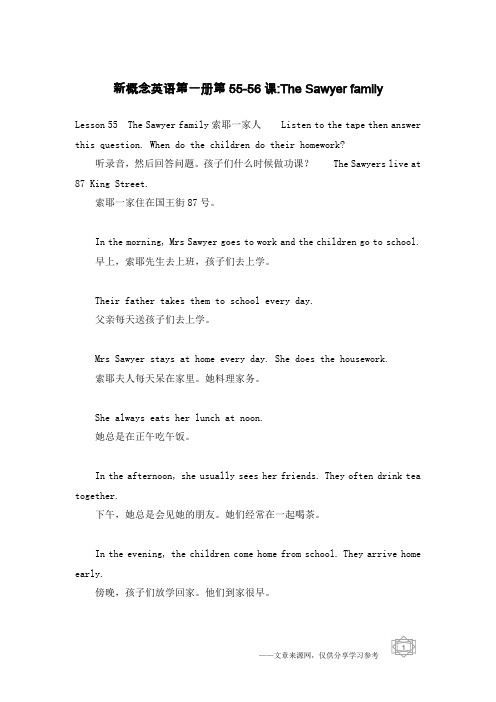
新概念英语第一册第55-56课:The Sawyer familyLesson 55 The Sawyer family索耶一家人Listen to the tape then answer this question. When do the children do their homework?听录音,然后回答问题。
孩子们什么时候做功课?The Sawyers live at 87 King Street.索耶一家住在国王街87号。
In the morning, Mrs Sawyer goes to work and the children go to school.早上,索耶先生去上班,孩子们去上学。
Their father takes them to school every day.父亲每天送孩子们去上学。
Mrs Sawyer stays at home every day. She does the housework.索耶夫人每天呆在家里。
她料理家务。
She always eats her lunch at noon.她总是在正午吃午饭。
In the afternoon, she usually sees her friends. They often drink tea together.下午,她总是会见她的朋友。
她们经常在一起喝茶。
In the evening, the children come home from school. They arrive home early.傍晚,孩子们放学回家。
他们到家很早。
Mr Sawyer comes home from work. He arrives home late.索耶先生下班回家。
他到家很晚。
At night, the children always do their homework. Then they go to bed.晚上,孩子们总是做作业,然后去睡觉。
新概念英语第一册第55课
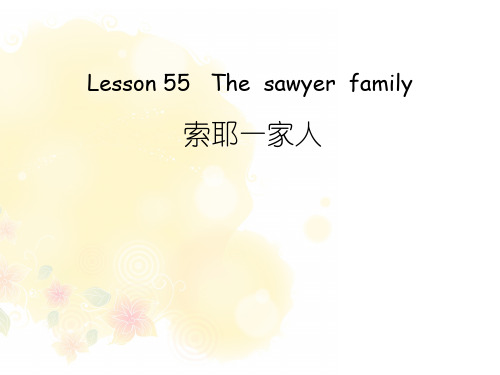
adv. 一起
n. v. 晚上 到达 夜间
n.
live v. 住,生活(是指长久的居住,住在自己家中) 你住在哪里? eg: where do you live ? live in .....住在…… 后接国家名称或城市名称(接大地点) 我住在北京。 eg: I live in Beijing. live at …..住在……后面接确切的地址 (接小地点) 索耶一家住在国王街87号 eg : The Sawyers live at 87 King Street. stay v.
arrive in France
到达酒店 arrive at the hotel
到家
arrive home
He always does his homework all night.
Text The Sawyers live at 87 King :
Street. the+姓氏+s,, at+地址时,在具 表示某某一家人。体的门牌号,在 the Wangs 城市或者街名前 王先生一家人 要用in In the morning, Mr. Sawyer goes to work (上班)and the children go to school.(上学) Their father takes them to school every day. 把某人带到某地 take sb to sp My mother often takes me to the park,
In the morning Mr. Sawyer
①goes to work take children to school
At noon
新概念英语第一册Lesson55_64课文注释
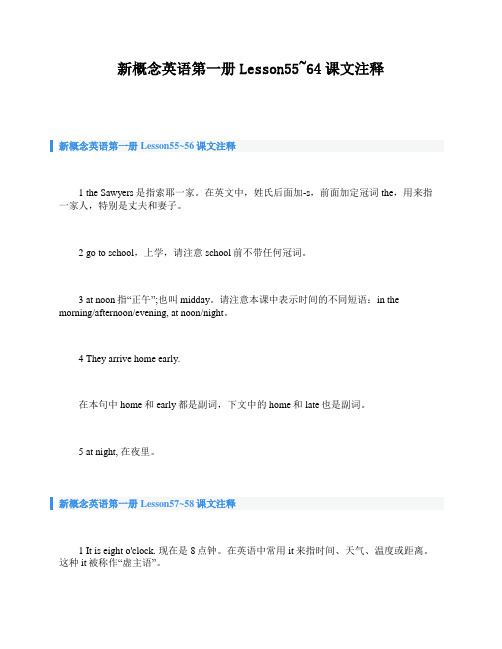
新概念英语第一册Lesson55~64课文注释新概念英语第一册Lesson55~56课文注释1 the Sawyers是指索耶一家。
在英文中,姓氏后面加-s,前面加定冠词the,用来指一家人,特别是丈夫和妻子。
2 go to school,上学,请注意school前不带任何冠词。
3 at noon指“正午”;也叫midday。
请注意本课中表示时间的不同短语:in the morning/afternoon/evening, at noon/night。
4 They arrive home early.在本句中home和early都是副词,下文中的home和late也是副词。
5 at night, 在夜里。
新概念英语第一册Lesson57~58课文注释1 It is eight o'clock. 现在是8点钟。
在英语中常用it来指时间、天气、温度或距离。
这种it被称作“虚主语”。
2 by car,乘汽车。
on foot,步行。
这两个状语短语均用来表示方式。
3 at the moment,指眼前,“此刻”。
新概念英语第一册Lesson59~60课文注释1 Do you want the large size or the small size?这句话是选择疑问句,逗号前的size读升调,后者读降调。
2 I only have large ones.句中的ones指pads。
3 What else do you want? 您还要什么吗?其中的What else…? 可以看作是表示疑问的一个短语,意思是:“还有什么吗?”新概念英语第一册Lesson61~62课文注释1 What's the matter with him? 他怎么啦?What's the matter with…? 常用来询问人或事物的状况,常作“是否有问题?”“是否有麻烦”讲。
2 feel ill,觉得病了,feel是系动词,ill是表语。
新概念英语第一册第55课

lunch
早餐
breakfast 晚饭 supper
n.
n.
午饭
n.
吃早餐/午饭/晚饭
have breakfast/ lunch /supper
afternoon
n. 下午
morning /evening 早上/晚上 在早上/中午/晚上 In the morning/afternoon/ evening
Language points
1.the Sawyers
the + 姓氏+ s = the + 姓氏 + family
2.go to work \ school \bed \ hospital 3.take sb to sp e home from school \ work 5.arrive home early \ late 6.read a newspaper 7.watch television \ TV
home n. 家 ;adv. 住家,到家 1) n. 家 欢迎来我家 eg: Welcome to my home . 在家 at home 呆在家 stay at home 她总是呆在家 eg: She always stays at home. 2)adv. 住家,到家(副词前不能加介词) 3)回家 4)go home 到家 come home 她经常到家很晚。 eg: she always comes home late. housework n. 家务 做家务 do the housework 家庭主妇 housewife
⑧do their homework
What do\does+someone+(频率副词)+do+时间状语? 某人通常在某个时间做什么? 他们早晨通常做什么?
新概念第一册 第55课

中间 干净的 空的 不整齐的 再说一遍
照耀 步行 照片 山谷 大楼 在…之间 之间
河岸 沿着 努力地 涂画 书架
前面 掉下 花瓶 沸腾
茶壶 老板 请求 书写 糟糕的 新鲜的
告诉 牛排 天气 宜人的 有时候 总是
掸掉灰尘 爬 横过
最喜欢的
There be 句型
祈使句
单数变 复数
lunch :中餐 breakfast 早餐 dinner/supper 晚餐
用餐have/eat breakfast/lunch/dinner/supper afternoon 下午 evening in 夜间
noon
在某日的夜里用介词on
the morning the afternoon the evening
主+动词(do/does)+其它
当主语是第三人称单数时,动词后面需加以变化 1)直接+s 2)sh,ch,o ,s 结尾+es
3)以辅音+y 结尾,变y 为 i + es,元音+y结尾,直接+s.
改成否定句(don’t/doesn’t) 改成否定句(don’t/doesn’t), 疑问句( 疑问句(Do/Does…?) 1.The Sawyers live at 87 King Street. 2. Mr. Sawyer goes to work.’ 3. The children go to school. 4. Their father takes them to school every day. 5. She eats her lunch at noon. 6. She usually sees her friends. 7. They a0r-rive home early. 8. They go to bed. 9. Mr. Sawyer reads his newspaper.
(完整word版)新概念英语第一册~课文及翻译

Lesson 1 Excuse me! 课文1 对不起!1。
Excuse me!对不起2。
Yes?什么事?3。
Is this your handbag?这是您的手提包吗?4. Pardon?对不起,请再说一遍。
5。
Is this your handbag?这是您的手提包吗?6。
Yes, it is。
是的,是我的。
7. Thank you very much.非常感谢!Lesson 3 Sorry, sir。
$课文3 对不起,先生。
8。
My coat and my umbrella please。
请把我的大衣和伞拿给我.9。
Here is my ticket.这是我(寄存东西)的牌子.10。
Thank you, sir。
谢谢,先生。
11。
Number five。
是5号.12. Here's your umbrella and your coat.这是您的伞和大衣13. This is not my umbrella。
这不是我的伞。
14。
Sorry sir。
对不起,先生.15。
Is this your umbrella?这把伞是您的吗?16. No, it isn't.不,不是!17。
Is this it?这把是吗?18。
Yes, it is.是,是这把19. Thank you very much。
非常感谢.Lesson 5 Nice to meet you $课文5 很高兴见到你。
20。
Good morning。
早上好。
21. Good morning, Mr。
Blake。
早上好,布莱克先生。
22. This is Miss Sophie Dupont。
这位是索菲娅。
杜邦小姐.23. Sophie is a new student.索菲娅是个新学生。
24. She is French。
她是法国人.25。
Sophie, this is Hans.索菲娅,这位是汉斯.26。
新概念英语第一册第55课笔记

新概念英语第一册第55课1.the +姓(复数)表示一家人2.the Sawyer family=the Sawyers索耶一家3.the Black family=the Blacks布莱克一家4.live in 居住在+大地点5.live at 居住在+小地点6.go to work 去上班7.go to school去上学8.go to bed 去睡觉9.go home 回家10.take ———to —--带---去——-11.stay in/at 呆在(大/小)12.do the homework/housework做作业/做家务13.at noon在中午14.see sb看望某人15.drink tea=have tea喝茶16.eat lunch=have lunch吃午饭e home from work下班回家e home from school放学回家19.after school放学20.after class下课21.after work下班22.arrive in/at到达(大/小)23.arrive home(省略介词) 到家24.at night在夜晚25.at noon在正午(中午12:00)26.at midnight在午夜(半夜12:00)27.read newspapers读报纸测试:1.表示一家人(两种表示)2.索耶一家(两个短语)3.布莱克一家(两个短语)4.居住在+大地点5.居住在+小地点6.去上班7.去上学8.去睡觉9.回家10.带--—去--—11.呆在(大/小)12.做作业/做家务13.在中午14.看望某人15.喝茶16.吃午饭17.下班回家18.放学回家19.放学20.下课21.下班22.到达(大/小)23.到家24.在夜晚25.在正午(中午12:00)26.在午夜(半夜12:00)27.读报纸。
- 1、下载文档前请自行甄别文档内容的完整性,平台不提供额外的编辑、内容补充、找答案等附加服务。
- 2、"仅部分预览"的文档,不可在线预览部分如存在完整性等问题,可反馈申请退款(可完整预览的文档不适用该条件!)。
- 3、如文档侵犯您的权益,请联系客服反馈,我们会尽快为您处理(人工客服工作时间:9:00-18:30)。
新概念英语第一册Lesson55~64课文注释
新概念英语第一册Lesson55~56课文注释
1 the Sawyers是指索耶一家。
在英文中,姓氏后面加-s,前面加定冠词the,用来指一家人,特别是丈夫和妻子。
2 go to school,上学,请注意school前不带任何冠词。
3 at noon指“正午”;也叫midday。
请注意本课中表示时间的不同短语:in the morning/afternoon/evening, at noon/night。
4 They arrive home early.
在本句中home和early都是副词,下文中的home和late 也是副词。
5 at night, 在夜里。
新概念英语第一册Lesson57~58课文注释
1 It is eight o’clock. 现在是8点钟。
在英语中常用it来指时间、天气、温度或距离。
这种it被称作“虚主语”。
2 by car,乘汽车。
on foot,步行。
这两个状语短语均用来表示方式。
3 at the moment,指眼前,“此刻”。
新概念英语第一册Lesson59~60课文注释
1 Do you want the large size or the small size?
这句话是选择疑问句,逗号前的size读升调,后者读降调。
2 I only have large ones.
句中的ones指pads。
3 What else do you want? 您还要什么吗?其中的What else…? 可以看作是表示疑问的一个短语,意思是:“还有什么吗?”
新概念英语第一册Lesson61~62课文注释
1 What’s the matter with him? 他怎么啦?
What’s the matter with…? 常用来询问人或事物的状况,常作“是否有问题?”“是否有麻烦”讲。
2 feel ill,觉得病了,feel是系动词,ill是表语。
注意feel ill和look ill在意思上的区别;前者指自我感觉,后者指外表形象。
3 It’s 09754. 其中It’s指“电话号码是”。
4 have a bad cold, 得了重感冒。
5 That’s good news中的news是不可数名词,不是复数形式。
6 Good news? 是省略句,完整的句子应为Is it good news?
新概念英语第一册Lesson63~64课文注释
1 He’s better.
在英文中,如果将一个人或物等与另一个人或物等进行
比较,就可以用比较级。
在这句话中,威廉斯夫人是把吉米今天的状况和前几天相比。
形容词well的比较级形式不规则,意思是“健康状况有所好转”。
2 come upstairs, 上楼,此处upstairs是副词。
3 …you mustn’t get up yet.
yet这个词一般用于否定句。
get up表示起床,在英语中有不少动词常与介词或副词连用,组成一个词组,称为动词短语;如get up就是一个动词短语。
4 for another two days,
for引导的表示时间的短语往往可以译作“达”,“计”。
本课中for about two hours each day可译为“每天可达两小时”。
each day是“每天”的意思。
5 keep the room warm, 使房间保持暖和。
